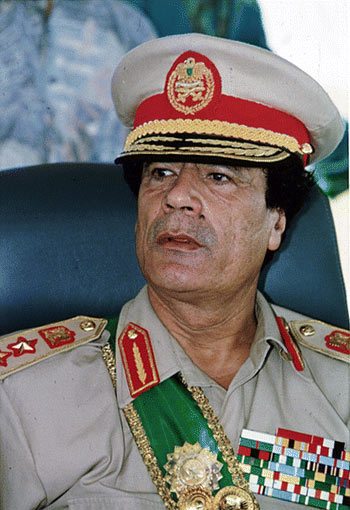Qaddafi, Muammar al-
1942–2011
Libyan military and political leader
Muammar al-Qaddafi (also spelled Khadafy or Gadhafi) has been the head of the government of LIBYA since 1969. He was born in northern Libya into a family of Bedouin, nomadic desert-dwelling Arabs. After attending a local Muslim school, he entered the Libyan Military Academy and began rising through the ranks of the Libyan army. Qaddafi became a committed nationalist, determined to reform his country. In 1969 he and several other officers led a coup that overthrew King Idris I. Qaddafi became commander in chief of Libya's military forces and chairman of the Revolutionary Command Council, which he established as the nation's governing body.
Qaddafi took immediate steps to transform Libya and purge it of European influences. He enforced Islamic law and outlawed alcohol, nightclubs, and non-Muslim churches. He closed U.S. and British military bases, forced most Italian and Jewish citizens to leave the country, and seized control of foreign-owned petroleum plants. During the 1970s, income from petroleum sales supported the Libyan economy while Qaddafi experimented with economic reforms, such as abolishing retail stores and giving landlords' property to tenants.

Qaddafi tried to forge unions between Libya and other Arab nations in the Middle East, but he was unsuccessful. He bitterly criticized EGYPT for entering peace talks with Israel, and he involved Libyan forces in civil conflicts and coup attempts in Egypt, SUDAN, and CHAD. Many countries criticized Qaddafi for his support of guerrilla movements such as the Palestine Liberation Organization (PLO), the Black Panthers, and the Irish Republic Army. The United States viewed him as an enemy and a sponsor of international terrorism.
In 1986, in response to the bombing of a German nightclub thought to have been carried out by Libyan agents, U.S. forces bombed Qaddafi's residence in Tripoli. He escaped but began to make fewer public appearances. During the 1990s, Qaddafi's program of reform suffered setbacks after the Soviet Union, which had supported his government, collapsed.